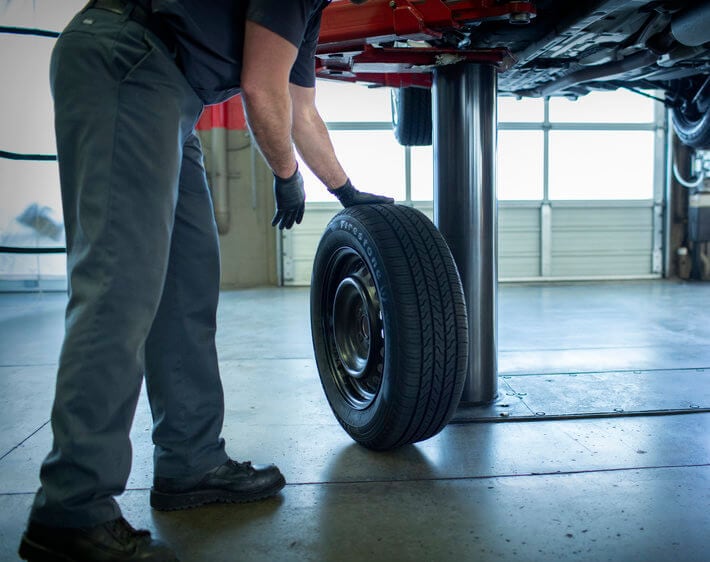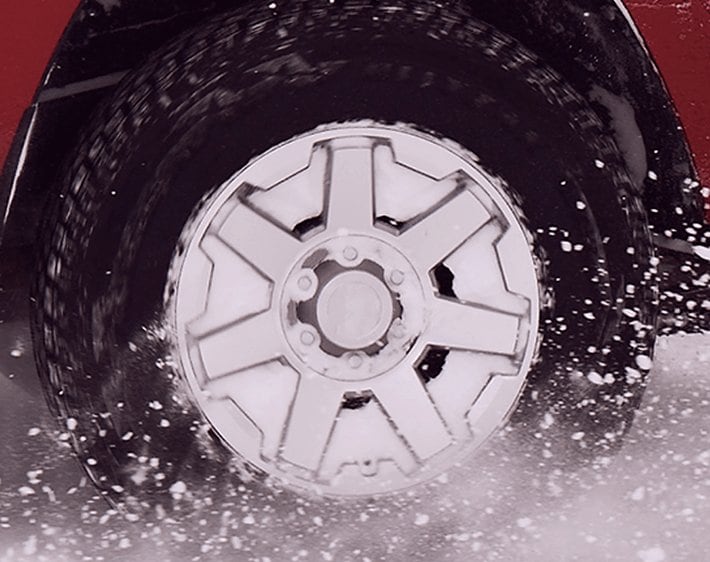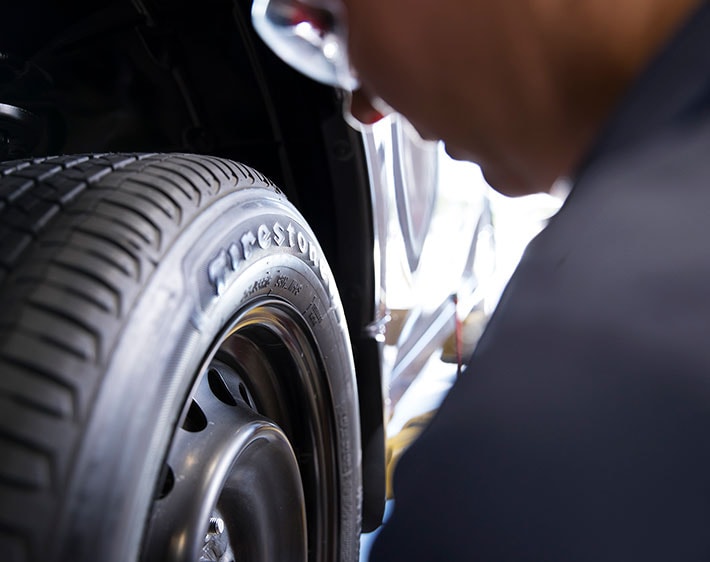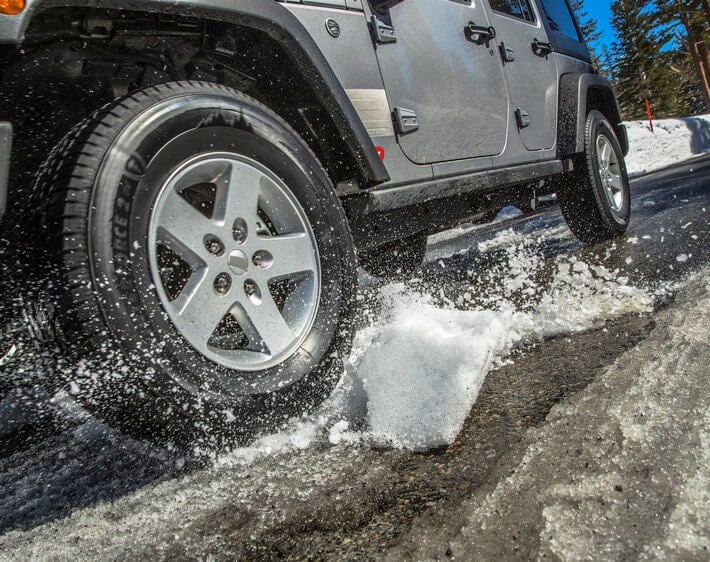There’s a difference between choosing tires and choosing the right tires. We know not everyone cares as much as we do about tires, so we’re here to lend a hand! Here’s everything you need to know about how to choose tires, starting with determining your tire size, deciding on a tire type, and identifying the qualities you care about most in a tire.
Determine your tire size.
The first thing you’ll need to determine is the tire size (or diameter) you need. Tires come in all different diameters, from 13 inches all the way to 22 inches. So, how do you find out which size your vehicle needs?
One way to find your tire diameter is by checking the information placard on the inside of the driver’s side door. This will tell you the wheel diameter for your specific vehicle.
You can also check your current tires. Do you see that jumble of letters and numbers on the sidewall? They'll look similar to: 215/65R15. The diameter of your wheel in inches is the very last number in that series. In this case, 15. Take a look at the image below. It’s not too difficult to figure out what size tires you need—and once you know, you can narrow down your tire choices pretty quickly.
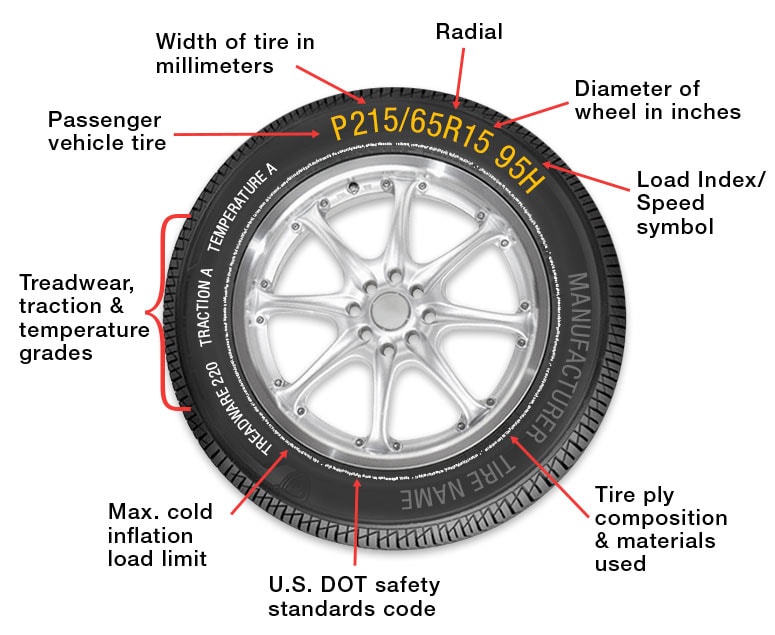
Choose your tire type.
Once you’ve figured out the size you need, it’s time to figure out what type of tire you need—and there are a lot! This is often when drivers can feel stuck, especially when learning how to choose tires for the first time.
Tire types include all-season, winter, high performance, summer, and more. Here’s a quick explanation of each so you can determine what works best for your location and lifestyle. Most of these tire types can be found for a range of vehicles including cars, trucks, minivans, SUVs, and crossovers.
- All-season tires: All-season tires are created for exactly what the name implies… all seasons! They’re engineered for a smooth, quiet ride, fuel efficiency, and good tread life. However, because all-season tires are created to handle every season, they’re a compromise and don’t do well in extreme weather. They’re great for drivers who live in places with mild winters, but they can’t handle serious ice, snow, and sub-zero temperatures.
- Winter/snow tires: Winter tires are great for the winter extremes that all-season tires can’t handle. They’re created from special rubber that doesn’t stiffen in freezing temperatures, and they provide exceptional traction for winter-y road conditions like ice, slush, and snow. If you live somewhere with brutal winters, you’ll need winter tires.
- Performance tires: High-performance tires are created for drivers who really care about speed and performance. These tires harness every ounce of your engine’s horsepower and grip the road like race tires, but they also have reduced tread wear ratings and typically don’t last as long as other types of tires. You’ll often see high-performance tires on sports cars.
- Summer tires: Often, “regular” tires are called “summer” tires. Basically, a summer tire can handle three seasons out of the year—don’t try to drive on these in cold weather or snow. Summer tires provide excellent damp-road traction, so they’re perfect for spring showers and summer thunderstorms. However, their soft rubber hardens when the temperature dips below freezing, making them insufficient for winter driving.
- All-terrain tires: If you enjoy taking your vehicle off the beaten path, all-terrain tires may be your perfect match. These tires are created to tackle all surfaces, from mud to sand to rocks—and they look heavy-duty too. These tires can certainly handle the beaten path as well! Take these bad boys on normal roads and highways and you’ll experience the comfort and handling of everyday “on-road” tires.
- Touring tires: Touring tires are premium tires engineered for drivers who value smooth, comfortable driving and superior handling. They offer reliability, a long tread life, and minimum noise. Most touring tires are all-season and can handle the typical wet and dry conditions, but they cannot handle snow, freezing temperatures, and other extreme weather conditions.
- Mud-terrain tires: Mud-terrain tires can handle soft surfaces, like deep mud and sand, better than any other tire. Consider mud-terrain tires a more aggressive variation on all-terrain tires! The deep, rugged tread pattern helps your vehicle get solid traction on the least solid terrains. Their intense design is perfect for off-roading, but won’t be quite as smooth, silent, or comfortable on normal roads.
- Spare tires: Can't forget about these good ol' guys! When the unexpected happens, spare tires are here to save the day. For spares, you have the option to get a full-size or compact tire. A full-size tire is simply a fifth tire for your car. Pop it on your car when one of your tires fails and you’re relatively good to go for the long-term. A compact tire is a temporary fix. It will take up less room in your car than a full-size tire, but it can’t handle high speeds or sub-optimal road conditions. A compact spare will get you to the auto shop so you can get a new tire, and that’s about it.
Identify the Right tire for YOU.
The last things to consider after you’ve pinpointed size and type are specific qualities of different tires, like cost, appearance, brand, and so forth. In other words, this part involves selecting the perfect tire out of a selection of good tires!
Many drivers choose to stick with the same tires that came on their car when they got it. After all, if it ain’t broke don’t fix it! If you are ready to venture out, though, Firestone Complete Auto Care makes it easy.
Head to our online tire catalog and enter in your vehicle type or tire size to get started. From there, select your priorities in a tire from things like ride comfort, tire wear, and noise level. We’ll narrow it down, and then you can compare relevant options on things like appearance and cost!
Visit Firestone Complete Auto Care.
There's a lot to consider when picking out the best tire for you, but we’re here to help every step of the way. Whatever your tire size or preferred tire brand, you can be sure we’ll have what you need at your local Firestone Complete Auto Care. Get a tire quote online or stop by your local store to consult with a knowledgeable tire technician today!
